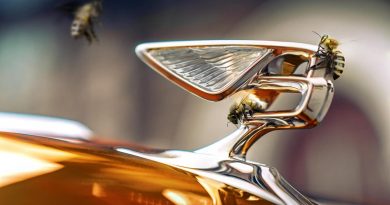World-First Graphene Public Road Surface Laid in the North East
A car park in Redcar and Cleveland has become the first public road in the world to be laid with a brand-new graphene additive, designed to enhance the performance and longevity of the surface.
The project was a collaboration between Redcar & Cleveland Borough Council (RCBC), Tarmac, and Universal Matter GBR — which developed and manufactures the additive — and saw the access road and car park at Flatts Lane Country Park near Normanby relaid with the new surface.
Graphene is a remarkable material, composed entirely of carbon atoms arranged as a lattice of interlocking hexagons, with numerous applications and research avenues. As it is one atom thick, it’s often described as a two-dimensional material, and it has exceptional electrical conductivity and tensile strength, as well as being almost transparent in its single-layer form.
Universal Matter makes the graphene from waste carbon sources like old tyres and waste biomass in a process called “Flash”. This uses a brief pulse of electricity to heat the material to 3,000K, quickly reducing the stock into a particular type of the graphene known as “turbostratic”.
While Universal Matter itself is a Canadian company, the UK arm was established as Applied Graphene Materials in 2010 before a buyout in 2023 and is based in the area at the Wilton Centre, Redcar. It developed the polymer additive, called Genable Pavement, which incorporates the graphene. This then replaces the existing resin used in binding the aggregate for the asphalt road surface.

In principle, the graphene additive improves how the aggregate binds in the final asphalt, providing a broader spread of operational temperatures — increasing the upper limits without harming cold temperature performance — reducing cracks and ruts, and providing better resistance to fatigue.
As well as sequestering carbon, it also allows for increased use of recycled asphalt (RAP) and Universal Matter’s research claims a 35% reduction in fatigue damage over 10 million “equivalent single axle loads” — or heavy vehicle passes. Universal Matter also notes that there’s no significant cost difference for the Genable product compared to standard additives.
The test in Redcar and Cleveland is the first time a public road has been laid with the additive, but it has been previously trialled in other locations such as the Universal Matter global HQ car park in Burlington, Ontario, and is part of the National Center for Asphalt Technology’s test track build for 2024-2026, near Opelika, Alabama.
Andy Gent, commercial director of Universal Matter GBR, commented: “It’s an exciting day for the business globally because it represents a real step forward for the product. It’s great to see it taken from the lab stage to full road application. This product has great potential, and we are delighted that Tarmac agreed to participate.”
RCBC’s cabinet member for highways and transport, Cllr Carl Quartermain adds: “This is fantastic news for our area, showcasing the innovation and expertise of businesses right here in Redcar and Cleveland. We look forward to continuing this partnership and bringing more pioneering projects into our borough, strengthening our reputation as a hub for advanced materials and sustainable infrastructure.”
Should the test at the relatively quiet Flatts Lane car park prove successful, there’s plenty more roads in our region that could benefit from resistance to potholing.




